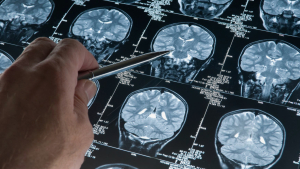At the beginning of the 1970s, African -American Psychiatrist Chester Pierce from Harvard University repeatedly had the same unpleasant experience. In a class he taught, a white medical student came up to him after each session. He told him how the course should be structured or how the chairs should be placed. Pierce felt instructed. "It's not about what the student says in this conversation," he wrote. "But about how he approaches me, how he speaks to me, how he seems to look at me."
Pierce felt patronized as a black man. On the basis of such experiences, he coined the term "microaggressions" for statements in everyday communication that are perceived as offensive. Although the concept is still controversial today, recent research suggests that microaggressions are quite real and have noticeable consequences for the body and psyche.
The concept only arrived in the academic mainstream in 2007 when the psychologist Derald Wing Sue from Columbia University gave him stricter contours: he regarded microaggressions as subtle, everyday humiliation and reductions in people. This can be verbal statements, but also behaviors, such as if minorities are ignored. Microaggressions can be intentionally or occur unintentionally. A typical example of this is the question that the blacks or people of other ethnic groups in Europe often hear: "Where do you come from?"
"This question has a damaging effect," says social psychologist Andreas Zick from the University of Bielefeld. "And if it is consciously or unconsciously connected to the message: You are not one of them." In the original version, microaggression referred to racist humiliation towards People of Color. But you can always feel other minorities such as homosexuals. Ultimately, there are microagdression in many different forms. Zick also includes that People of Color, for example, often receives poorer medical care.
Scientifically, the idea is debatable.
Whether something is seen as microaggression or not depends crucially on the experience of the person concerned. "If a person feels attacked, for example by the question of their origin, she is the victim of microaggression," explains Zick. But such statements cause criticism. How should you examine something scientifically that is ultimately completely subjective? The American psychologist Scott Lilienfeld, who died in 2020, therefore argued that the subjective impression of a person alone was not enough to speak of microaggression.
"The concept of microaggressions remains scientifically controversial," says sociologist Il-Tschung Lim from the Justus Liebig University of Giessen. The person to whom a statement is addressed has the authority to define. "I find that problematic. Because then it would be completely irrelevant what the sender actually meant by the statement.«
Lim is also asked again and again due to his appearance and name where he actually comes from. Or you generously point out how good his German is - even though he was born in Germany and has spent his entire life here. "Especially when the question of origin comes from nothing, I find it at least out of place," says the sociologist. But he does not automatically understand them as microaggression. The problem is: "In this way you already write what the question means." However, it can be just as good that the other person is a great fan of Korean cuisine or the Korean cinema and only asks for it. So you always have to look at such statements in context - and that makes the concept of microagdressions vulnerable.
According to Lim, the knowledge of microaggression can certainly help to communicate more sensitively. But one should not evaluate all ambiguous statements as microaggression. "This would be a pathologization of everyday experiences."
In Andreas Zick's eyes, the context in which a statement is made also plays an important role. There are certainly situations in which, for example, the question of origin is not asked for racist reasons, but because one is really interested in which country the other person comes from. "That was the case with the refugees," says Zick. »And the question can also be connected with the fact that people want to pay attention to cultural differences.« Therefore, one must additionally prove that the perpetrator has racist or other negative attitudes.
Covert hostility or cultural faux pas?
The clinical psychologist Monnica Williams from Ottawa University examined in 2021 whether there is always aggression behind microaggressions or whether people may only be carried away with microaggression because they do not know that such actions are wrong - as critics of the concept like to object. In the end, are supposed microagdressions just a kind of cultural faux pas?
In her study with more than 600 subjects, white participants should first imagine certain situations - for example, a study unit on current events and racist political issues. Then you should indicate whether you would make statements in this context like: »Everyone suffers. Not only black people. "Or:" Everyone can succeed in this society if they work hard enough. "Afterwards, black test subjects were allowed to judge how racist they thought they were such statements. It showed that statements that the black subjects found particularly racist were also less inclined to make white subjects. So there was a certain consensus about how hurtful certain statements were.
With the help of questionnaires, the psychologist also recorded how strongly the white participants were prone to aggressive behavior – whether verbally or physically. The more aggressive the participants were, the more likely they were to resort to microaggressions. Williams' conclusion: Microaggressions are indeed an intentional form of aggression and not simply a cultural faux pas.
Stress, anxiety, and depression can be exacerbated by microaggressions.
You don't have to share this flat -rate conclusion. Nevertheless, the indications are increasing that microagdressions can have very real consequences for those affected. Sometimes they are compared with small mosquito bites: if you are stabbed once, it only itches for a short time. But if you always get a stab in the same place, it may never heal.
For a review of the consequences of microaggressions, psychologist Lisa Spanierman from Arizona State University and her colleagues analyzed 138 studies. The researchers came to the conclusion that microaggressions can negatively affect mental and physical health. Physiologically, microaggressions in those affected, for example, were accompanied by increased levels of the stress hormone cortisol.
An extensive meta-analysis by psychologist Priscilla Lui from Southern Methodist University shows what microaggressions can mean for the psyche in concrete terms. If people were confronted with microaggressions to a greater extent in their lives, this was accompanied by various problems, including anxiety disorders, depression and increased stress. Those affected were more prone to addictions such as gambling addiction, smoked more often and drank more alcohol. This was true both for people who were subjected to racist microaggressions and for those who were victims of microaggressions due to their sexual orientation.
Often microaggression burden those affected for a long time. This is evidenced by long -term data that Micere Keels from the University of Chicago collected from more than 460 black people and Latinos. If they experienced microaggression during the high school, they suffered more often from the symptoms of depression at the beginning of the college period.
"Microaggressions put a strain on the body and psyche," says Bielefeld-based social psychologist Andreas Zick. Usually not immediately, but in the long run. This is especially the case when it is not possible to cope with the experiences. "If you exclude those affected from society, they withdraw and can become lonely." Often people who have a lot to do with microaggressions become hypersensitive at some point. "You really expect to be belittled by others," Zick explains.
So far, microagdressions have been a hot and controversial topic, especially at universities in the United States. There they have led to real grave stamps in recent years. On the one hand, the defenders of freedom of speech are located, on the other those who want to protect against discrimination. There are ethnic, religious or sexual minorities that feel discriminated against and name this discrimination with the help of the idea of microaggression.
In Europe, on the other hand, there is still no real concept of microaggressions, says Andreas Zick. But even here on land, one could benefit from bringing the topic more into focus: "It helps us to recognize hidden aggression.«



















